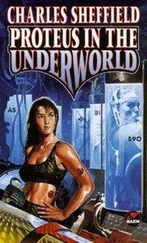“For example,” he said at last, “I do not know your views of either politics or foreign affairs, but as mark of Helen’s independent views, let me say that while I greatly oppose last year’s revolt of the American colonies, she rejoices in it.”
Darwin glanced at Watt, Pole, and Boulton, before he replied. “We are of mixed opinions. Myself, I hope for the ultimate success of the breakaway colonies. The more troubling question is, will it lead to other revolutions, closer to home?”
Matthew Boulton nodded vigorously and leaned forward. “That is exactly what I tell Erasmus. We are all of us firm monarchists here—quiet, Jimmy.” Watt had made a sound between a grunt and an asthmatic wheeze, and Boulton turned to him. “I know that you favor the Young Pretender, but still you crave a monarch, even if he does not happen to be King George. Mr. Solborne, I have travelled much in Europe since the revolt in the Americas. France is stirring. There is unrest and fear in the royal families of Bavaria and Bohemia. The Margrave of Brandenburg has formed a special guard to seek out revolutionaries. Where will it end? Where should it end?”
“We will certainly hold that debate—on another occasion.” Darwin held an open palm out to Jacob Pole, who sat frowning and waiting for his turn to speak. “Peace, Jacob. The floor belongs to Mr. Solborne.”
The visitor, unfamiliar with the digressive give-and-take of Lunar Society members, had been sitting bewildered. At Darwin’s “If you please, continue,” he nodded.
“As I was saying, despite her young age and strong opinions, Helen is familiar with the ways of the world. Or so I thought.”
Solborne fell silent again, until Darwin coaxed him: “Tell us about her. What does she look like, what are her interests?”
“She is as fair as I am dark. Friends have told us, it is an astonishment that two so different in appearance could be born from a single womb. She is short in stature, even for a woman. Helen claims five feet, but I suspect the final inch. Dainty in features and form. Men apparently find her attractive, since she turns heads at every market, fair, or gala. They pursue her. She sheds them with ease.”
“She lacks interest in men?”
“Say rather, that Helen is more interested in other things. I mentioned her artistic sense. That is secondary to her interest in philosophy and her gift for mathematics. Few men can tolerate more than five minutes of Euclid, Archimedes, Spinoza, and Newton. They come, they listen, and they leave shaking their heads. So when Helen made a visit to Bristol to examine brocades, and wrote to say that she had been given an opportunity to see the demonstration of an extraordinary mathematical device, I was not in the least astonished—not then, or when she extended her stay by three days to learn more of what she had seen. I was, however, much surprised one week later, when she returned to Newlands. She was not alone. She had with her Professor Anton Riker of Bordeaux, and his extraordinary calculating engine. Have you heard of it?”
The others turned to Darwin. His grey eyes were thoughtful, and in them stirred something that Jacob Pole at least had seen before: an overwhelming and insatiable curiosity. “I know of the calculator built by Monsieur Pascal over a century ago,” he said slowly, “which performed addition and subtraction by mechanic device. I am familiar with the improved version constructed by Herr Gottfried Leibniz, a generation later, which also permitted multiplication and division. But the name of Professor Riker is new to me.”
“As it was to me, and to Helen. She insisted that the professor, together with his machine, visit Newlands. Let me say that initially I was surprised by the appearance of a guest, but not disturbed. It was only later that my aversion to Professor Riker developed.”
“His description, too, if you will.”
“Above middle height, and thinner than Colonel Pole. According to Helen, his eyes are grey with a tawny center and he possesses a gaze of peculiar intensity, but I cannot speak to that myself since he has not once met my eye. He has an accent to his speech, something I think of Central Europe, but I do not have ear or experience enough to place it. He is courtly and charming in manner, but it seems the false charm of a dancing master or an actor.”
“Seems to you .”
“You are very perceptive, Dr. Darwin. Helen and I disagree strongly. She cannot see beyond his brilliance, which in truth appears to be very great. The performance of the Riker calculating engine defies description.”
“I will nonetheless request that you attempt it.”
“I knew you would. Here.” Solborne reached into a pocket of his leather jacket and produced a folded sheet of paper, thick and the color of clotted cream. “This is not my drawing. It is Helen’s.”
Darwin unfolded the sheet and held it close to one of the candelabra, while the other four crowded around. The main line drawing was in green ink and filled half the sheet. An expanded detail of one part was shown above.
“I have seen it for myself,” Solborne said. “This is accurate as to both layout and proportion. Here on the flat upper surface”—he touched the upper part of the sheet—“you see nine keys or levers. Here are nine more. Each lever has ten possible settings, for the numbers zero through nine. Thus it is possible to define two numbers, each with up to nine digits. This is an eight-way lever which controls the operation of the engine. Addition, subtraction, multiplication, division, and the extraction of roots up to fifth order. And here”—he touched the paper again—“is where a number of up to eighteen digits appears. It is contained on a strip of paper, and it is printed , as by controlled type.”
“Are these dimensions accurate?” Darwin was crouched with his nose almost to the paper.
“They are. The whole engine, including its base, is two feet wide, three feet deep, and rather less than three feet high. It is also heavy, ten stone or more.”
“Ah.” Darwin leaned back, his face sad and oddly disappointed. “Then I am obliged to question the inventive genius of Professor Anton Riker. There was, eight years ago, on display in the court of Emperor Joseph of Austria—”
“The automaton chess player of Baron Wolfgang von Kempelen, which took the form of a seated Turk.”
“You know of it.”
“Certainly. It was no automaton, but relied upon a hidden accomplice. The device was otherwise impossible.”
“I am not persuaded of that. Before von Kempelen’s secret was revealed, Mr. Solborne, I wasted an inordinate amount of my time and foolscap seeking to define a possible mechanism. I was unable to prove that such a chess-playing machine is impossible theoretically ; only that it would be prodigious complicated, and probably enormous in size.”
“Those observations would be yet more true of this ‘calculating engine.’ Dr. Darwin, my first response was yours exactly. This new machine, like the chess automaton, must be operated by some confederate of Professor Riker.
“Helen soon convinced me otherwise. First, the machine stands alone, not on some specially constructed dais or platform able to conceal a man. It works in bright light, with everything visible, rather than in obscuring gloom. The von Kempelen device was operated using a system of balls and magnets, impossible in this case. Finally, and far more important, consider what the engine does : the printed output is the result of a difficult arithmetic calculation, and it normally appears within thirty seconds of the complete statement of the problem. The input numbers are provided not by Riker, but by the audience—I have done it myself. There is no way that an assistant could know the problems in advance. Even with the use of tables, it would be impossible to provide the cubic root or quartic root of a nine-figure number, or the product of two such numbers, so quickly.”
Читать дальше












